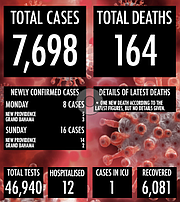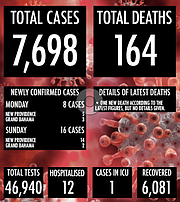By TANYA SMITH-CARTWRIGHT
HEALTH officials have to clear up public “misconceptions and misinformation” about COVID-19 and associated vaccines as the government prepares to have the drug in The Bahamas “as soon as possible”, a top doctor said yesterday.
The Pan American Health Organisation has said more than once the vaccine should reach the region by March.
“The Ministry of Health and the government of The Bahamas is working very hard to make the vaccine available as early as possible,” Dr Nikkiah Forbes, director of the National HIV/AIDS and Infectious Disease Programme at the Ministry of Health, said.
“They have prioritised procurement of the vaccine. As the minister has said, The Bahamas has put forward funds already in an effort to procure that vaccine as soon as possible. All efforts are being made and we can expect it in 2021.”
Asked about fears of issues with the vaccine, Dr Forbes explained what the focus should be when dealing with the drug.
“Key issues about the vaccine, in the general broad context, would be to make sure that globally the vaccines are acceptable and available to all including developing countries,” she said. “Barriers to accessibility such as costs and other factors would ideally be minimised.
“We know that the government of The Bahamas has committed to procuring the vaccine as early as possible and we can expect that in 2021. There is another issue that we have to consider and that is vaccination coverage that is broad enough to result in herd immunity. This is important.”
Dr Forbes, a member of the COVID-19 task force, said it’s important to work through the misconceptions of COVID-19 and its, now available, vaccines.
“Vaccines are one thing but people have to be vaccinated for there to be the desire of preventing disease and having immunity,” she said. “For example, there was a study in the United States looking at vaccine hesitancy or scepticism. About 50 percent of the persons expressed that they might be hesitant and so we do have to work through misconceptions and misinformation about COVID-19 and the vaccine and concerns that may arise because of the accelerated production and the availability of these vaccines and to reiterate that safety remains stringent in those studies.
“Of course we should remember the facts that people with COVID-19 – that not everyone will have mild to moderate disease and do okay. Many people will have severe disease and maybe even die. So, it’s valuable and important to have a vaccine that can prevent infection, essentially.”
Both the United Kingdom and the United States have begun vaccinating its citizens, prioritising those in the healthcare systems and those at high risk for contracting the potentially deadly virus. Asked how The Bahamas will prioritise its recipients, she said: “In general, it should be the persons who are most at risk of getting COVID- 19. Those persons could be front line workers – like healthcare workers, like people who have comorbidities. That would be a logical and reasonable approach.
“Notably that could be different for different countries and populations aside from frontline workers. For example in some countries they had a problem with long term care facilities so that might be included.”



